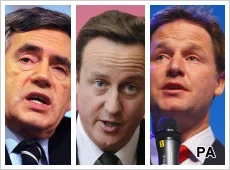A significant number of British people are yet to make up their minds as to how they are going to vote at the next general election, sparking interest in possible voting patterns in light of the much-anticipated live televised leader debates scheduled to take place in the months before the election.

In a poll conducted on 3rd of March, 28% of adults indicated that they might still change their minds when it comes to who they will vote for at the election, currently expected to take place in early May. While 64% claim to have made up their minds already, in electoral terms, 28% remaining undecided is significant; and with the poll lead between the two main parties currently fairly small, clearly there is a lot still to play for.
The results also appear to confirm the well worn truism that it is difficult to predict the ‘youth vote’. People become more certain of which way to vote the older they are, with 72% of over 55 year olds claiming to have already made up their minds, followed by 66% of 35-54 year olds and just 53% of 18-34 year olds. All parties are likely to be mindful of the need to capture younger voters’ support in the coming weeks and months, and the debates will surely be one of the most important fixtures on the leaders’ calendars.
In particular, the party leaders will no doubt be hoping that the upcoming televised debates, which are to be shown on terrestrial television, will help them appeal to younger and undecided voters. The poll suggests that 27% of the British public feel ‘absolutely certain’ that they will watch at least one of the upcoming televised debates with a further 19% claiming to be ‘very likely’ to watch them. Only eight percent indicated that they wouldn’t be watching any.
The aftermath of these television debates could prove to be of particular significance for the Conservative Party, with 42% of voters expecting David Cameron to perform the best out of the three main party leaders. This compares to just 16% thinking Gordon Brown will perform the best, and 11% backing Nick Clegg.
Political commentators will no doubt point to the now famous John F. Kennedy-Richard Nixon debates of 1960, which were to prove pivotal in the US presidential campaign. Indeed, the leaders’ debates now scheduled for British television have come under criticism by some for aping the American model.
With a significant number of people admitting to have no fixed voting intention and the ‘youth vote’ appearing relatively unpredictable, the first live televised debates ever to be held in the UK may take on an unparalleled significance when the country goes to the polling booth two months from now.
For survey details and full results, please click here





